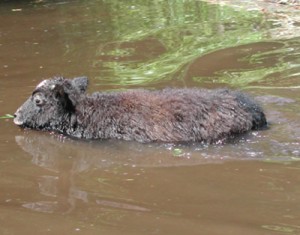Parasite prevention is a very circumstantial endeavor. What works perfectly in one situation may fail completely in another, so it is impossible to offer universal advice. Furthermore, we have been fortunate enough, or perhaps wise enough, that we have always lived in a part of the world where these parasites are a mild nuisance, not a plague, so our advice may not be valuable for people who live in southern states or other parasite-friendly climates. Each person needs to reach their own conclusions concerning insecticides, and I am in no way judging anyone else who has come to a different conclusion!
That said, every spring we stock up on our chosen weapons to do battle against these little buggers, and I thought it might be beneficial to some of our readers to share what we have found most effective in case you have not thought of some of these tools.
There is one misconception that I find troubling: many people seem to believe that topical pesticides are essentially unavoidable given the fact that not using them allows for the transmission of lethal diseases and therefore obviously insecticides are a better choice than death, even if they cause some degradation of overall health. These people (and institutions) simply douse every pet with Frontline, Advantage, Revolution, or a similar product every month because they are afraid that otherwise their animal might get a flea or a tick. In my opinion this is misguided, although it certainly makes the companies selling the products quite happy! The truth is: depending on where you live, there is a chance that your dog might contract from fleas or ticks a disease that might be serious or lethal and using insecticides reduces but does not eliminate the risk of these diseases.
No question, fleas and ticks are undesirable and can carry disease, so I am not suggesting that anyone simply live with them. I am suggesting that in many parts of the country, topical insecticides can be used far less often or eliminated altogether by using some less harmful tools as a first line of defense. Constantly applying toxins to avoid fleas or ticks is a last resort to be utilized only when less harmful alternatives have failed.
You must balance two unknowns: how much damage will be caused to your animal by administering toxins versus how likely it is that your dog will contract a disease and how damaging that disease will be. You need to research your region, and your dogs’ lifestyle and make the best possible decision, and you need to refine that decision over time to make sure it remains the healthiest all around solution for your pets.
Here are the main tools we use to keep parasites at bay:
- Swimming—there are a few things in life that are genuine wins, and swimming is certainly one of them. During the warm months, we swim most of our dogs several times a week. This cools them off, exercises them, and removes the majority of external parasites. We vary between fresh pond water, salt water, and pool water, but most days we swim some and delight in knowing we are reducing parasites without harming our pets!
- Borax—another truly wonderful tool. We sprinkle borax on our floors, let it sit overnight, and vacuum it up, and we do this several times a month. Borax has very low toxicity to mammals, but is extremely effective at eliminating fleas.
- Food grade diatomaceous earth—this is sprinkled in the area around our house, and essentially performs the same purpose outside that the borax performs inside.
- Vacuuming: do not forget this simple piece of the puzzle. Frequent vacuuming (and either immediate bag disposal or inclusion fo some borax or flea toxin in the bag) can be a hugely effective tool in eliminating fleas.
- Laundry: wash dog bedding and any other fabrics often.
- Guinea fowl/peafowl/chickens—these guys all eat ticks, what could be better? Depending on your circumstances, if you can populate your property with some of these, you can reduce the tick population.
- Sheep/goats with frontline: these help to eliminate ticks in two ways. First, by eating down the brush they reduce the appeal of the environment for ticks, and second if you apply a topical insecticide to your livestock, they are out there all day attracting and killing fleas and ticks.
- Combing—frequent grooming of your pet will not only help eliminate fleas and ticks, it is also essential to your knowing whether or not your tools are succeeding.
- Bathing—in addition to swimming, the occasional soapy bath obviously helps.
- Herbal repellents—there are many concoctions of essential oils that can be misted onto your dog before walking through the woods to help discourage ticks. Some of these seem to be very effective. Remember that herbal does not mean non-toxic, so research the ingredients and make sure that whatever you are applying is not harmful.
- Flea traps—commercial flea traps, or a bowl of soap water under a light, are another useful way to eliminate fleas, and also another diagnostic tool that lets you know when fleas have circumvented your control methods.
- Nematodes—so far we have never needed to add these to our arsenal, but they are certainly a viable option, and some people have reported excellent results. It seems that soil conditions play a significant role in determining nematode efficacy, and I am not nut sure if the nematodes can survive diatomaceous earth.
- Carpet spray: I try to avoid using pesticides, but in case of a bad infestation where none of the other options are proving effective, spraying a long lasting IGR type spray along baseboards and in other nooks and crannies around the house can be helpful.
If the above are not adequate, there are of course many environmental and topical insecticides that you can use as needed…


